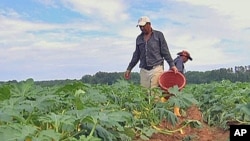As summer fruits and vegetables ripen across U.S. farmland, the work of harvesting them depends on illegal immigrants.
Americans are sharply divided over what to do about illegal immigration in the United States. Conservatives have been harshly critical of the Obama administration for blocking a controversial Arizona law intended to identify and deport more illegal immigrants, who critics say are taking American jobs.
But farmers across the country have a different view. As Americans have moved away from agriculture, farm employers say they have come to rely on illegal immigrants to harvest the fresh fruits and vegetables on the nation's dinner tables.
Land of opportunity
The squash harvest is underway in the eastern state of Virginia. A crew of Hispanic workers are picking, washing, and packing the bright yellow vegetables destined for supermarkets across the East Coast.
Like generations of immigrants before them, they came to America seeking economic opportunities.
Many come illegally. One worker — called simply Martinez to protect his identity — says he paid a Mexican smuggler two thousand dollars to transport him across the U.S.- Mexico border. He walked across the desert for eight nights and slept by day before making his way here to Virginia.
"We come to advance ourselves, more than anything," Martinez says. "And in our country, we can't do anything. For a better future, I came to this side. And the truth is, we really suffer a lot to get across."
'They come for work'
Loreto Ventura first crossed the border illegally 30 years ago to work in the fields. He's a farm crew boss now, and a U.S. citizen.
"They come to work," he says. "They pay a lot of money to come here, and they risk [their] lives for work. And for work that's hard work."
Farm workers are up before dawn every morning and work all day in the hot sun. They spend the day stooping over picking vegetables and carrying heavy loads.
Of the roughly one million farm workers in the United States, most are immigrants, and an estimated one-quarter to one-half of them are illegal.
Farm work? No, thanks
With U.S. unemployment near 10 percent, many believe illegal immigrants are taking jobs from Americans. But when the United Farm Workers union launched a campaign offering to connect unemployed people to farm jobs, only three people accepted -- out of thousands of inquiries.
Union president Arturo Rodriguez says most balked at the difficult working conditions.
"They really don't have any idea what it is to work in agriculture today," he says. "We've just gotten so far away from that type of society that people have forgotten."
The United States has a guest worker program that would allow farm employers to hire immigrants legally. But farmers like this one — who asked to remain anonymous — describe it as a bureaucratic nightmare.
"Every farmer I know would gladly use the program and be legal," he says. "Every Hispanic would love to be legal. But the program is so onerous, it's so hard to use, and so expensive....And you don't necessarily get your people. [If] the crop is ready, [and] the people are not here, boom, it's a loss. Most growers will not take that chance."
He says he's tried to hire Americans, but he simply can't find enough able and willing do the work.
"The truth is, nobody is raising their kids to be farm workers," he says.
Lower wages?
But Jack Martin with the Federation for American Immigration Reform says that's not the whole story.
"I think it's true that parents have higher aspirations for their kids than agricultural labor," he says. "Nevertheless, there are a lot of unemployed people who, if they could make a living wage working in agriculture, I think, would do so."
Martin says wages, benefits and labor conditions for farm workers have remained relatively poor for decades because of the steady stream of illegal immigrant labor.
As for the guest worker program, he says, "It is true that it is more expensive than hiring the illegal immigrant that shows up with fake documents because of the fact that there are protections for the American workers — they have to hire American workers if they are available first — and there are protections for the foreign workers."
Without those protections, Martin says, illegal immigrants are at risk of exploitation.
A bill that would reform the immigration system is stuck in Congress. Meanwhile, farmers are increasingly concerned about losing their workforce to immigration crackdowns. They say without workers to pick the crops, fresh fruits and vegetables will rot in the fields of American farms.
And eventually, they say, those farms would wither away, too.




